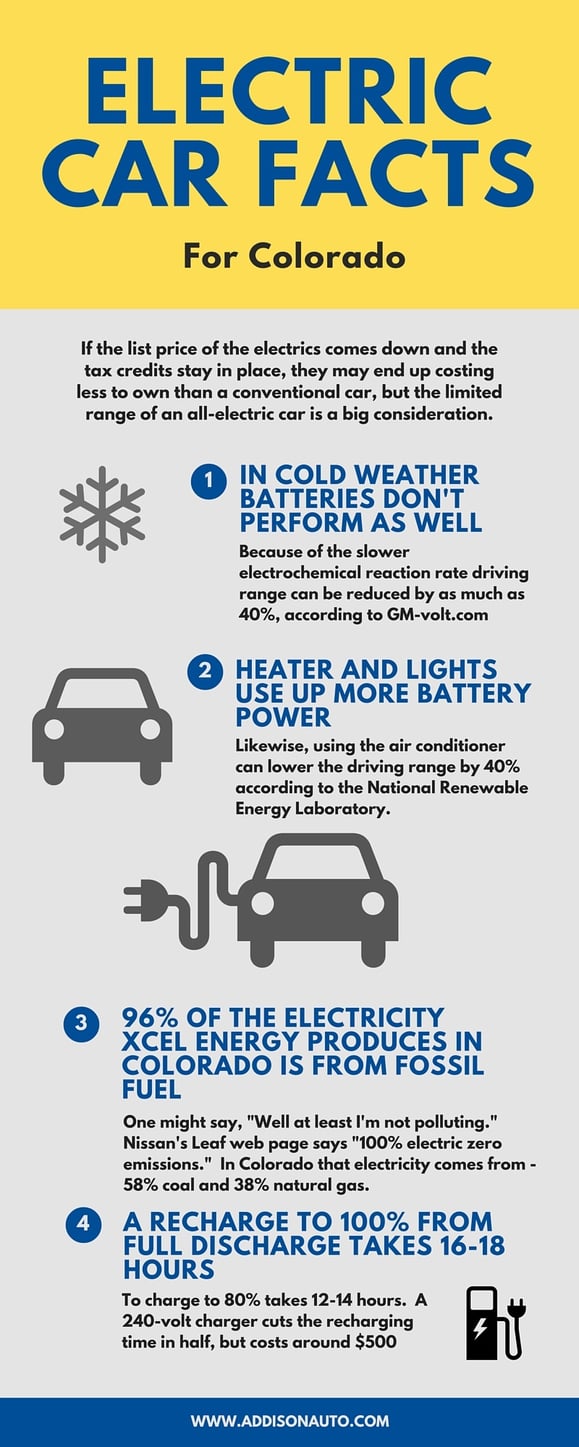My first job after college in 1973 was at Denver's first Saab dealer (Saab Denver). They sold Saab, Subaru and an electric car, the Vanguard Citicar. Actually "sold" is a misnomer... it sat on the lot the whole time I was employed there.

Maybe today's electric vehicles will sell better but a number of factors can affect the efficiency and functionality of these vehicles. Read below to find out how the new electric vehicles perform here in Colorado.
Two new electric vehicles hit dealer showrooms in 2011 - the Chevy Volt and the Nissan Leaf. The Volt is a plug-in hybrid electric car with a gas generator that kicks in when the battery gets down to 30%. The Leaf is strictly electric and needs to be plugged in to AC power to recharge.
As originally advertised, the Volt was rated at 40 miles per charge and the Leaf at 100 miles per charge. The EPA rates the Volt at 35 miles and the Leaf at 73 miles.
Both vehicles will charge on 120 volts, but to recharge to 100% from full discharge takes 16-18 hours. To charge to 80% takes 12-14 hours. A 240-volt charger cuts the recharging time in half, but costs around $500, and if you don't have 240 volt power in the garage, the Nissan website says, "The average estimated cost of a standard home charging dock installation in a typical new home is approximately $2000, plus tax and license fees. Federal tax credits may offset a portion of the costs."
What About Cold Weather?
In cold weather batteries don't perform as well because of the slower electrochemical reaction rate. This can reduce the range driven by as much as 40%, according to GM-volt.com!
The Volt's gas motor will recharge the battery when it gets low, but in the Leaf the turtle icon comes on and that means get home quick before it dies. An MSNBC story says that some Leafs (or should I say leaves?) are running out of battery power sooner than expected.
If cold weather cuts the Leaf's driving range by 40%, that leaves a range of 44 miles - and that's before the heater and lights use up more battery power. Likewise, using the air conditioner can lower the driving range by 40% according to the National Renewable Energy Laboratory.
One might say, "Well at least I'm not polluting." Nissan's Leaf web page says "100% electric zero emissions." However, 96% of the electricity Xcel Energy produces in Colorado is from fossil fuel (58% coal and 38% natural gas). Then one might say, "Well at least it's cheap to drive."

The cost to run an electric vehicle is low; at 10 cents per kilowatt hour it costs only $2.50 to recharge the batteries. This comes out to between 3.5 to 10.5 cents per mile. Estimating the cost of gas at $3.50/gallon the following are the cost per mile:
| Warm Weather | Range | Cost/Mile |
Equivalent MPG at $3.50/gal |
| Leaf - without running air conditioning | 73 miles | 3.4 cents | 103 mpg |
| Volt - without running air conditioning | 35 miles | 7.1 cents | 49 mpg |
|
|
|||
| Cold Weather | Range | Cost/Mile |
Equivalent MPG at $3.50/gal |
| Leaf - cold weather or with air conditioning running | 44 miles | 5.7 cents | 61 mpg |
| Volt - cold weather or with air conditioning running | 21 miles | 11.9 cents | 29 mpg |
The total costs may tell a different story. Edmunds lists the "5 year cost to own" for every vehicle they review. Several factors go into the cost to own including depreciation, taxes, financing, fuel, insurance, maintenance and tax credit. Here are a few of the results:
- 2012 Chevy Volt $43,224
- 2012 Nissan Leaf $34,905
- 2012 Chevy Cruze $35,054
- 2012 Honda Accord $37,034
- 2012 Toyota Corolla $32,235
For the electrics, the cost to own doesn't include the 240-volt charger or the Colorado tax credit. If the list price of the electrics comes down and the tax credits stay in place, they may end up costing less to own than a conventional car, but the limited range of an all-electric car is a big consideration.
Have questions, contact us. We've been serving the Denver area for more than 30 years.


